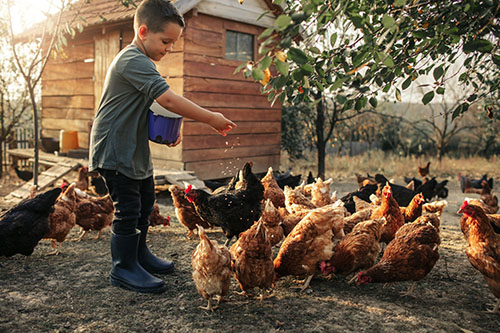Composting Chicken Manure
Sep 07, 2021

September is National Chicken Month! The popularity of raising backyard chickens has grown in popularity, especially due to the shift to organic food products. Many people would prefer to eat farm-raised eggs and home-grown vegetables, but how do these two food categories relate? Believe it or not, chicken manure is the perfect organic fertilizer for your lawn and garden!
Because chicken waste is high in nitrogen, it should first be broken down through composting. Compost bins can be purchased from the store, or you can make a homemade compost bin from pallets or other types of containers.
Composting is not a difficult process, but you must make sure to balance your materials. In general, your compost should contain carbon-based material and nitrogen-based material in a ratio of 25:1. Carbon-based material includes dry material such as sawdust, straw, dry leaves, wood chips, newspaper, and cardboard. Nitrogen-based material includes wet material such as chicken manure, vegetable scraps, grass clippings, coffee grounds, and weeds. Chicken manure can make up one-third of the nitrogen-based materials in your compost.
There are a few essentials to keep in mind when setting up your compost system. The beneficial bacteria in the compost need moisture of about 50 to 60 percent, so it doesn’t hurt to leave your bin out in the rain for a little while to soak up the water. The compost should also be turned and mixed at least once a week to add oxygen, which will help the microbes break down materials. Lastly, proper composting will produce heat of 160° to 170° F for a few days to kill most pathogens, so you may need to buy a thermometer to monitor the temperature.
The decomposition process typically takes six months to complete, but the results you will see in your garden are well worth the wait! Simply mix your compost into your garden soil 2 to 3 weeks before planting, and you’re all set for the season!
There are so many benefits of raising your own chickens. Visit your local Co-op for all your poultry supply needs and feed, plus expert advice for first-timers!
For more content like this, check out the latest issue of